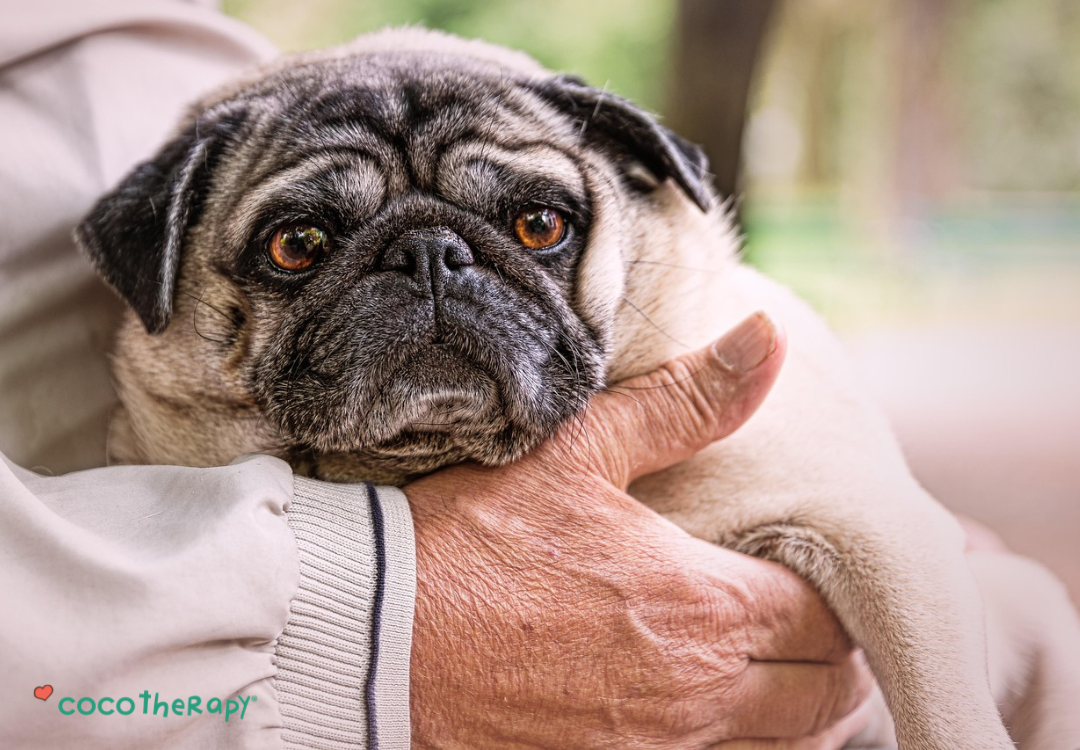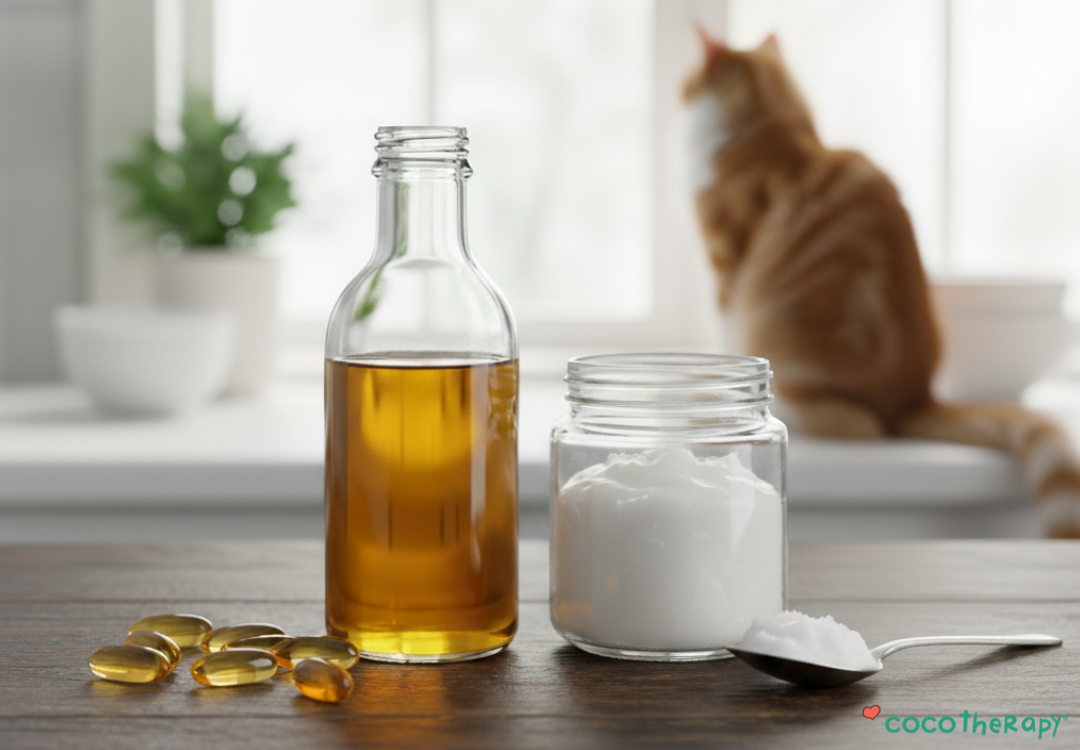If you share your home with a Cavalier King Charles Spaniel or you are thinking about adding one to your family, you may have heard about genetic health concerns that affect the breed. One of these concerns is Medium-Chain Acyl-CoA Dehydrogenase Deficiency, or MCADD. This condition changes how a dog processes certain types of fat, especially the fats found in coconut oil and MCT-rich foods.
In this post, we’ll take a close look at what MCADD is, how it shows up in Cavaliers, what current research tells us, and what it means for diet and care decisions. We’ll also cover the important role of testing, practical management tips, and how coconut oil fits into the conversation.

What Is MCADD?
Medium-Chain Acyl-CoA Dehydrogenase (MCAD) is a key enzyme that helps break down medium-chain fats for energy. When a dog inherits a mutation in the ACADM gene, this enzyme doesn’t work properly. The result is MCAD deficiency, commonly shortened to MCADD.
Without this enzyme functioning normally, a dog can’t metabolize medium-chain fats efficiently. For most dogs, that’s not a problem. For those with MCADD, it means their body is unable to use these fats as an energy source when they need it most.
How Fat Metabolism Works (The Simple Version)
Normally, when a dog eats fats, the body breaks them down into smaller molecules that can be used as energy. Short-chain fats are burned quickly. Long-chain fats go through a more complex process. Medium-chain fats, like those found in coconut oil, are meant to provide quick energy through the MCAD enzyme pathway.
When the enzyme is missing or nonfunctional, the body cannot fully complete this process. Instead of getting fuel from medium-chain fats, the body faces an energy gap.
What Goes Wrong in MCADD
The biggest issue arises during times when the body needs to switch to stored fat for fuel, such as during fasting, illness, or strenuous activity. If a dog can’t burn those fats, blood sugar can drop to dangerously low levels. That’s when serious clinical signs appear, including lethargy, seizures, incoordination (ataxia), or even coma.
This is why MCADD episodes often seem sudden. One day a dog may appear perfectly fine. The next, an illness or missed meal reveals the underlying problem.
Why It Matters for Your Dog’s Day-to-Day
For pet parents, the concern with MCADD is that everyday events can trigger issues. A Cavalier with this condition may look healthy most of the time but run into trouble when stressed, ill, or fed foods they’re unable to metabolize.
Common triggers include:
- Skipping meals or prolonged fasting
- Stomach upset that limits food intake
- Vigorous exercise that increases energy demand
- Eating foods or supplements rich in MCTs, such as virgin coconut oil (VCO)
Clinical signs can escalate quickly, which makes it essential for pet parents to recognize red flags and seek veterinary care immediately. Even if episodes resolve, they should never be ignored, as each event puts stress on the body and brain.
MCADD in Cavaliers: What Current Research Shows
MCADD has been identified in multiple breeds, but Cavalier King Charles Spaniels appear to be especially at risk.
One pivotal study focused on a 3-year-old male Cavalier experiencing seizures and lethargy. Genetic analysis revealed a frameshift mutation in the ACADM gene, which caused the MCAD enzyme to be truncated and unable to function normally.
Put simply, a tiny error in their DNA meant the enzyme needed to break down fats couldn’t do its job right.
Researchers then expanded testing to 162 Cavaliers. About 23.5% carried the mutation, and a small but important percentage were affected (homozygous for the mutation). Broader breed surveys suggest:
- Around 5% of Cavaliers tested are affected (homozygous)
- Between 47% and 53% are carriers (heterozygous)
- Roughly 43% are clear
What Those Numbers Mean for Breeding and Everyday Care
These numbers don’t mean every Cavalier will have MCADD, but they do show the mutation is relatively common in the breed. For breeding programs, this highlights the importance of genetic testing to prevent pairing two carriers, which could result in affected puppies.
For everyday pet parents, the takeaway is clear: testing matters. Knowing whether your Cavalier is clear, a carrier, or affected allows you to make safe choices around diet and lifestyle.
- Clear dogs (homozygous normal) can process medium-chain fats normally
- Carriers (heterozygous) may have some genetic change but typically do not show disease
- Affected dogs (homozygous mutated) cannot metabolize medium-chain fats effectively and need special care
Coconut Oil and MCTs: Great for Most Healthy Dogs, Risky for Affected Cavaliers
Virgin coconut oil (VCO) has become a popular supplement among pet parents. It contains medium-chain triglycerides (MCTs), which in healthy dogs can provide quick energy, support digestion, improve skin and coat, and offer a wide range of other wellness benefits.
Integrative veterinarian Dr. Judy Morgan, who's well known in the Cavalier community, often highlights the benefits of VCO for healthy dogs. She uses it with her own Cavaliers to support skin, coat, and overall vitality.
However, for dogs with MCADD, MCTs can’t be broken down properly. Instead of being a source of fuel, they become a trigger for dangerous metabolic crises. That's why coconut oil, though safe for most dogs, can pose a significant risk for Cavaliers affected by MCADD.
As integrative veterinarian Dr. Karen Becker wisely reminds us:
"There are over 8000 genetic enzyme deficiency syndromes in pets so nutritionists for both people and animals have taken the logical approach: make safe and healthy recommendations for healthy patients. We must assume that humans caring for themselves or for other family members will take responsibility to investigate their genetic deficiencies enough to know what choices are best for their bodies and those that they care for. All of my recommendations are for healthy animals, and there are literally hundreds of caveats to every suggestion; yay for empowered pet parents that advocate for their individual animals' needs. Obviously, this recommendation is for animals that can process lipids."
What About Carriers and Clear Dogs?
If your Cavalier tests clear, coconut oil can be used in moderation as part of a healthy diet. For carriers, it is generally considered safe but should be introduced cautiously, with close observation for tolerance.
For affected dogs, the guidance is straightforward: avoid MCTs altogether. Instead, focus on a low-fat diet, frequent meals, and veterinary recommendations tailored to the dog’s individual needs.
Your Practical Action Plan
So, what should you do if your dog is affected by MCADD? Here’s a straightforward path you can follow, step by step.
- Start with a DNA test. Use a reputable lab to determine your dog’s MCAD status. Results guide every nutrition decision that follows. Ask your vet which labs they prefer and how to interpret “clear,” “carrier,” and “affected” reports.
- Never rely on a symptom trial. Skipping testing and “seeing what happens” with coconut oil can be risky for affected dogs. Clinical signs often show up during stress, illness, or fasting, not always right after the first taste.
- Feed for stability. If affected, choose a lower-fat diet, avoid fasting, and use more frequent meals to support steady blood sugar. Your vet may recommend specific snacks or meds during illness.
- Reassess during illness. Stomach bugs and surgery days raise energy demands. Have a sick-day plan with your vet, including when to offer quick-energy foods and when to seek care.
- If clear or a carrier, go slow. Introduce VCO gradually, track stool quality, energy, and skin and coat changes, and keep portions modest. Balance the overall diet rather than piling on fats.
- Keep your care team in the loop. Share test results with your primary vet and any specialists and revisit nutrition choices at annual checkups or after any major health changes.
Nutrition Snapshots by MCAD Status
| MCAD Status | Coconut Oil/MCTs? | Everyday Diet Focus |
| Clear (homozygous normal) | Yes, in moderation | Balanced diet; consider VCO as a supplemental fat if well tolerated |
| Carrier (heterozygous) | Likely yes, monitor | Balanced diet; introduce VCO slowly and observe closely |
| Affected (homozygous) | No | Low-fat diet, frequent meals, avoid MCTs; follow vet’s plan |
This table gives a quick reference point, but every dog is unique. Work closely with your vet to adapt these guidelines to your pet’s specific health status.
Talking With Your Veterinarian
Conversations about genetics can feel intimidating, but your vet is the best partner in managing MCADD. Bring up your concerns directly and share any DNA test results you’ve received. Key points to discuss include:
- Your dog’s breed and whether they’ve been tested for MCADD
- Any neurologic signs, lethargy, or fasting intolerance you’ve noticed
- Supplements you’re considering, such as virgin coconut oil
It’s also important to plan ahead for situations that could pose challenges, such as travel, surgical procedures, or illness. Having a strategy in place, like preparing safe snacks and avoiding long fasting periods, can prevent serious complications.
FAQs for Pet Parents
Pet parents often have practical questions once they learn about MCADD. Here are a few of the most common:
Can MCADD be outgrown?
No. Because MCADD is genetic, it doesn’t resolve with age. Management is lifelong.
Is coconut oil ever safe for an affected dog in micro amounts?
Even small amounts can cause issues, especially during stress or illness. For affected dogs, the safest choice is to avoid coconut oil and MCT-rich products entirely.
What if my Cavalier refuses food during illness?
This can be dangerous for an affected dog. Call your veterinarian right away for guidance and follow any emergency protocols they provide.
Are there alternatives to VCO for skin and coat support in affected dogs?
Yes. Your vet may recommend other fat sources or supplements that don’t rely on medium-chain metabolism, such as omega-3 fatty acids from fish oil.
Where Can You Go from Here?
If you’re a Cavalier pet parent, the most empowering step you can take is to test your dog. Once you know their MCAD status, nutrition decisions become much clearer. For dogs that are clear or carriers, coconut oil may offer wellness benefits when used thoughtfully. For those affected, avoiding MCTs and working with your vet ensures safety and stability.
Ultimately, knowledge is power. By testing, planning, and partnering with your care team, you can keep your Cavalier healthy and thriving. Whether or not coconut oil plays a role, the focus remains the same: supporting your dog’s unique needs with informed, compassionate choices.
Resources
Here are some trusted resources if you’d like to learn more about MCADD and Cavaliers:
-
PubMed Study on ACADM Frameshift Variant
Detailed scientific study that first identified the mutation in Cavaliers and measured its frequency in the breed.
https://pubmed.ncbi.nlm.nih.gov/36292732/ -
NCBI Genetics Overview of MCADD
Comprehensive medical background on MCADD, including biochemical pathways and clinical presentation in humans and animals.
https://www.ncbi.nlm.nih.gov/books/NBK560837/ -
Cavalier Health – MCADD Information
Breed-focused summary of what MCADD means for Cavalier King Charles Spaniels, including prevalence and care considerations.
https://cavalierhealth.org/mct.html -
Cavalier Matters – MCADD Guide
Clear explanation of symptoms, management strategies, and why testing is important for Cavalier families.
https://www.cavaliermatters.org/mcadd-medium-chain-acyl-coa-dehydrogenase-deficiency/ -
Laboklin Genetic Testing Information
Laboratory resource describing genetic testing for MCADD, including sample collection and result interpretation.
https://www.laboklin.co.uk/laboklin/showGeneticTest.jsp?testID=8288



